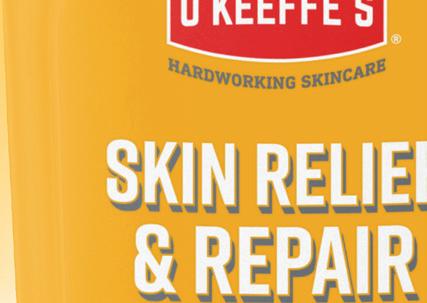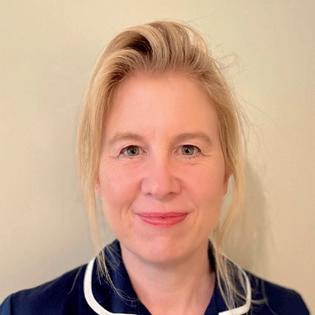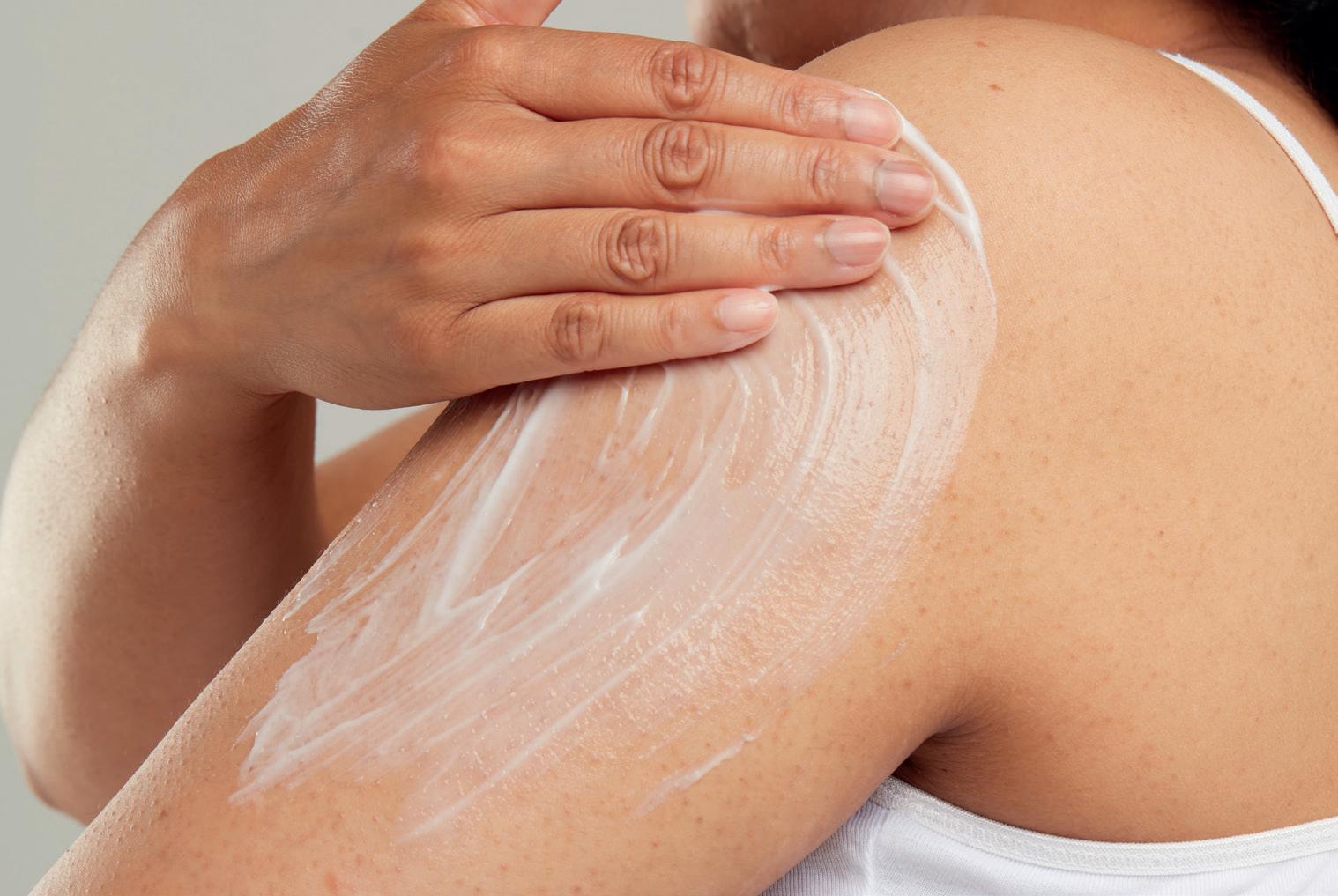Skin Health


Page 02

www.healthawareness.co.uk Q4 2022 | A promotional supplement distributed on behalf of Mediaplanet, which takes sole responsibility for its content
“The pandemic and increased hand washing has resulted in an increase in skin problems and eczema.”
Dr Emma Wedgeworth, Consultant Dermatologist, British Skin Foundation spokesperson
“Until recent years, the topic of menopause in general was glaringly absent from mainstream discussion.”
Dr Anjali Mahto Consultant Dermatologist and British Skin Foundation spokesperson
Page 06
Improving the outlook for eczema sufferers
As the weather gets colder, skin becomes increasingly dry and sensitive. For eczema sufferers, this often translates into worsening of their condition.
Eczema is an inflammatory skin condition characterised by patches of red, flaky, itchy skin. Eczema and dry skin are inextricably linked, so it’s important to tackle dryness as soon as it appears. Hydration of the skin is essential for healthy functioning and is controlled by the skin barrier, the outer layer of skin, known as the stratum corneum. Dry skin occurs due to depletion of natural lipids and water holding molecules that hydrate the skin barrier.
Genetic links
Genetics account for much of the reason why children develop eczema. Eczema goes alongside other conditions such as asthma, hayfever and food allergies. This tendency is known as atopy.
children reporting skin problems with their hands.
Finding suitable treatments
Treatment of dry skin, and indeed eczema, starts with gentle skin care. Avoid soaps, harsh washes and detergents. There are newer cleansing formulations, known as syndets, which are much gentler on the skin and don’t disrupt the natural acid mantle. Dry skin requires regular application of unfragranced emollients (moisturisers) to affected skin and can help compensate for increased moisture loss. Optimise your environment as well; lower the indoor heating temperature and consider a humidifier.
Eczema can impact on children’s physical and psychological health, as well as relationships, school and self-esteem.
If both parents have eczema, asthma or hayfever then there is a one in two chance their child will have eczema. Rates of eczema vary significantly across the world. In the UK, it’s estimated 20% of children suffer from it. However, the dramatic rise in eczema in previous decades and the significant variation across the world tells us that genetics alone are not responsible.
Lifestyle interventions
Day to day skincare habits impact our skin. The pandemic and increased hand washing has resulted in an increase in skin problems and eczema, with over half of young

For active eczema, medicated creams such as steroids or other anti-inflammatory creams can usually be used safely and effectively to reduce the itch and discomfort of eczema. In a small proportion of children, creams alone do not control eczema. We have an ever-increasing armamentarium of treatment options to tackle severe eczema. This includes light therapy, tablets and new targeted injections using monoclonal antibodies.
Eczema can impact children’s physical and psychological health, as well as relationships, school and self-esteem. Increasing understanding of the pathogenesis of dry skin and eczema has led to increased treatment options, and the future is brighter for eczema sufferers.
Why we sabotage our skin health, and how to stop
Using an SPF is a vital yet often overlooked step within your daily skincare routine. Instead of facing the consequences later, get into the habit of protecting your skin to keep it youthful and healthy.
When I talk to people about sun protection, unless they’ve been touched by skin cancer, most hear “blah, blah, blah.” Having spent the last eight years preaching the virtues of applying SPF30, when I get on this subject, I see the interest fade from people’s eyes. And yes, it’s souldestroying.
Reaching people
However, not one to give up — or bore people — I saw this attitude as a challenge and a signal that a different approach was needed in my vocation to impact the staggering growth of skin cancer rates in the UK.
While educating on the facts is important, it doesn’t cut the mustard. Everyone knows sunburn is dangerous, UV rays age the skin and melanoma can be fatal. We needed to go deeper.
Truth beneath the skin Looking at the psychology of avoidance, the solution boils down to this simple fact: Most of us believe a tan can enhance our social status and popularity by making us look more vibrant, sexy, alluring and healthy — and (this is the important bit) applying sunscreen can block that.
Please do read that sentence again, and be completely honest — is this you?
Until you face this reality, you’ll be hard-pushed to develop a good sun protection routine. That doesn’t mean just at the beach, but every day when outdoors for prolonged periods (such as playing sports). It will help you avoid the accumulated sun damage that heightens your risk of skin cancer and dramatically ages your skin.
Saving your skin
“Many of us spend a small fortune on moisturisers and makeup to ensure we look our best. However, a good SPF is the cheapest and best way to improve skin quality and vitality,” says Dr Sophie Shotter MBchB BSc HONS, Melanoma Fund ‘Sunguard’ Ambassador, Illuminate Medical Director and Founder.



Why not take advantage of that inbuilt desire to look your best, and instead of sabotaging your health and beauty, use SPF30 to improve it? At any age, you can slow down the wrinkle clock. If you’re a parent, you’ll be setting a fine example to your children, helping the next generation grow out of the issue.
Having read this far, I will assume I haven’t bored you but instead inspired you to think differently about sun protection, which starts by simply owning your truth.
02 MEDIAPLANET A PROMOTIONAL SUPPLEMENT DISTRIBUTED ON BEHALF OF MEDIAPLANET, WHICH TAKES SOLE RESPONSIBILITY FOR ITS CONTENTS READ MORE AT HEALTHAWARENESS.CO.UK
WRITTEN BY Michelle Baker CEO, Melanoma Fund
@HealthawarenesssUK Contact information: uk.info@mediaplanet.com or +44 (0) 203 642 0737 @MediaplanetUK Project
WRITTEN BY Dr Sophie Shotter MBCHB BSC HONS Melanoma Fund ‘Sunguard’ ambassador, Illuminate Medical Director and Founder
Manager: Eve Halliwell eve.halliwell@mediaplanet.com Business Development Manager: Emma-Jean Edwards Managing Director: Alex Williams Head of Business Development: Ellie McGregor |
Head of Print & Design: Thomas Kent Designer: Aimee Rayment Content Editor: Angelica Hackett O’Toole | Head of Digital Operations: Harvey O’Donnell Paid Media Strategist: Jonni Asfaha Social & Web
Please recycle
Editor: Henry Phillips Digital Assistant: Carolina Galbraith Duarte | All images supplied by Gettyimages, unless otherwise specified
WRITTEN BY Dr Emma Wedgeworth Consultant Dermatologist, British Skin Foundation Spokesperson
Melanoma Fund is a charity focused on raising awareness of sun protection in sport.
How to help people with atopic eczema have better conversations with their doctors
work, meet up with friends and just live life with eczema. It can be painful, it affects your sleep, your mood, and it is just generally quite exhausting living with eczema,” says Zainab who’s lived all her life with eczema.
Atopic eczema is a chronic inflammatory skin disease.1 It often starts in childhood, although it can develop at any age. It can be genetic; but stress and environmental factors — such as house dust and other irritants — can trigger it, too. You can grow out of eczema. However, where it persists, effective, long-term management is needed so that it can be sustainably controlled.
Uncomfortable, distressing symptoms
Major symptoms are rashes and itching. Shelley Watcham says: “You itch, so you scratch — which gives temporary relief but ends up making symptoms worse. As a result, an itch-scratch cycle develops. Skin can crack, ooze and bleed, making infection more likely.1 Inflamed skin can become red on lighter skin, and darker brown, purple or grey on darker skin.2
Eczema can be psychologically scarring
Severe and uncontrolled cases of the disease can take a heavy, emotional toll. Rippon Ubhi discloses: “In partnership with Allergy UK, we listened to 237 patients with eczema, and 78% of them said that it has a negative impact on their mental health;1 and we know that one-third of patients experience depression because of their eczema. It can hurt people’s confidence, so they don’t socialise. They may have to deal with social stigma, too1.”
“The need to scratch can also interfere with sleep, so a person may feel constantly tired. All of these issues can severely affect quality of life and have a broader impact on productivity1,” Watcham adds.
Don’t put off seeing your doctor
Ubhi urges people to “Be proactive, and don’t let eczema get out of hand before seeing a doctor.” It’s a condition that is relatively easy to diagnose. Unfortunately, the backlog in the health service in the wake of Covid-19 is making it difficult for patients with atopic eczema to see a dermatologist and ensure they are receiving the best possible treatment.
“Patients with suspected skin cancer are — rightly — being prioritised by dermatology services; so those with inflammatory skin conditions can end up having longer waiting times or reduced access as a result.”

Atopic eczema can be controlled Sanofi is a global healthcare company with a part to play in eczema care, as Ubhi shares: “At Sanofi, our whole mission is to improve people’s lives through developing and delivering treatment options for conditions like eczema.”
There are many treatment options for atopic eczema, so all hope is not lost. “When patients still experience symptoms despite receiving treatment, the condition is uncontrolled. However, we believe that uncontrolled eczema can be controlled when getting the right treatment, and good eczema management can be the outcome of that,” Ubhi adds.

Industry’s part to play in eczema care Healthcare professionals are working incredibly hard under very difficult circumstances and can only spend a limited amount of time with each patient. That may not be long enough to fully appreciate how someone with eczema may be feeling. That’s why we’re working with healthcare professionals, offering them education and training to give greater insight into the lives of those living with eczema.
Ubhi concludes, “We also have to ask: ‘How can we help patients have better conversations with their physicians?’ To that end, we’re working with patient association groups so that people with the condition know exactly what to say to their GP or dermatologist before their consultation. Plus, we’re advocating the support services that are available to patients with atopic eczema. Ultimately, for us, it’s all about putting the patient first and ensuring they have timely access to the latest treatment options.”
References
1. https://www.allergyuk.org/wp-content/uploads/2021/11/Not-Just-Skin-Deep-mincompressed.pdf
2. https://www.nhs.uk/conditions/contact-dermatitis/symptoms/#:~:text=Contact%20 dermatitis%20can%20cause%20skin,face%20are%20most%20often%20affected.

A PROMOTIONAL SUPPLEMENT DISTRIBUTED ON BEHALF OF MEDIAPLANET, WHICH TAKES SOLE RESPONSIBILITY FOR ITS CONTENTS READ MORE AT HEALTHAWARENESS.CO.UK 03 MEDIAPLANET
Find out more at sanofi.co.uk
“People sometimes underestimate what it takes to go to
Be proactive, and don’t let eczema get out of hand before seeing a doctor.
WITH Rippon
General Manager Specialty Care UK & Ireland, Sanofi
Paid for by Sanofi INTERVIEW
Ubhi
INTERVIEW WITH
Immunology,
WRITTEN
Document Number: MAT-XU-2205300 (V1.0) Date of Prep: December 2022
Shelley Watcham Franchise Medical Head,
Sanofi
BY Tony Greenway
care of
psoriasis in winter
Psoriasis is a visible autoimmune disease presenting as itchy, dry, scaly patches on your skin. It has detrimental effects due to the psychological, psychosocial and confidence issues that can arise when living with a chronic skin disease.
As winter approaches, cold weather is a common trigger for increased skin dryness. With psoriasis, eczema and other skin conditions, increased dryness can lead to inflammation, excoriation and — if left untreated — infections of the skin.
Managing psoriasis during the winter
In summer, the ultraviolet rays can help suppress the overproduction of skin cells that cause visible plaques. Due to reduced sunlight in the winter, this effect will be limited. To combat winter effects — moisturise, moisturise, moisturise.

This makes the skin more comfortable by decreasing dryness, scaling, itching and pain. There are multiple emollients to choose from. The best one to use is the one that suits you.

Choosing the right moisturiser
The terms ‘emollient’ and ‘moisturiser’ are often used interchangeably. Emollients are available in different formulations, and some can be used as soap substitutes as they are fragrance-free and kinder to the skin.
Lotions are water-based and easy to apply but can be runny. They are best for maintenance therapy. They are not as effective for moisturising dry skin but are effective in cooling the skin.
Creams are thicker and greasier than lotions. They’re a good daily option as they are also easy to apply.

Ointments are thick and greasy because they are oil-based. If your skin is very dry, they are the most effective option, but they don’t suit everyone. Top tip: Storing them in the fridge will create a cooling sensation once applied.

In winter, you may consider
switching to a thicker ointment or emollient as they retain moisture longer. Combining emollients such as a lotion, cream or gel during the day and ointment at night is worth considering.
More tips for winter
Shower in warm water as hot water can cause dry skin. Use emollient soap substitutes as they are less irritant and will moisturise the skin further.
A good tip is to carry a small pot of emollient to reapply at any time. Increase water intake to keep your skin hydrated and healthy. Wear comfortable clothes that don’t cause skin irritation.
Stress triggers flares and with the festive season around the corner, stressors may be heightened. Adopt a technique that suits you such as mindfulness, meditation or even gentle exercise to take your mind off of life’s stressors.
WRITTEN BY Teena Mackenzie BDNG Education and Development Lead, British Dermatological Nursing Group (BDNG)

WRITTEN BY Jodie Newman BDNG Education Nurse, British Dermatological Nursing Group (BDNG)




eczema
Eczema in young people is often misunderstood, being construed as something that does not require much time or attention. The reality is far from this, with eczema often causing periods of intense and painful flare-ups.

Although eczema itself is often a source of struggle, for many, a real challenge lies in accessing the right treatment — both from GPs and dermatologists. As young people with eczema, we understand this struggle and want to encourage other young people and their families to advocate for the treatment and support they need. As part of the Eczema Outreach Support Youth Panel, we have become aware of the importance of advocating for the treatment we deserve.
Lucie’s story
As someone who has been diagnosed with three types of eczema, in addition to scalp folliculitis, I am no stranger to the challenges that are presented by GP appointments. The majority of my appointments, even when my pain was clear and flare-ups were severe, were dismissed as ‘only eczema’ where I was handed my steroid cream and dismissed from any further treatment.
It was only after learning the importance of advocating for myself — which took two years of GP appointments to learn — and being clear that what I was experiencing was not ‘only eczema’ that I was able to access dermatological treatment and receive a diagnosis of the allergy that was causing the constant, red-raw, bleeding flare-ups.
I suffered from terribly painful flare-ups covering my whole body which lasted weeks and months at a time.

Silvia’s story
I’ve had severe eczema all my life and found it incredibly difficult to get proper treatment for many years. This, I felt, was due to my condition being misunderstood and not seen as a serious issue that was affecting my quality of life. I suffered from terribly painful flare-ups covering my whole body which lasted weeks and months at a time. Like Lucie, I was often dismissed by GPs by being told it was very minor, and I just needed to use more moisturiser.
It was only after years of pushing and fighting for a dermatology referral that I finally got one. Through continuously advocating for my experience and treatment, they started listening. My condition was finally recognised as very severe, and I was offered various treatments such as prednisolone, phototherapy and methotrexate. Not just creams! It was only through trying to make my voice heard, as well as trial and error, that I was able to find a treatment that made me feel normal. There is no shame in reaching out for help and support.
GUARANTEED RELIEF FOR
04 MEDIAPLANET A PROMOTIONAL SUPPLEMENT DISTRIBUTED ON BEHALF OF MEDIAPLANET, WHICH TAKES SOLE RESPONSIBILITY FOR ITS CONTENTS READ MORE AT HEALTHAWARENESS.CO.UK
visit the top tips
Let’s
for taking
your
Find out where to buy at OKeeffesCo.co.uk
OK_Guardian_SRR_Banner_Ad AW.indd 1 24/11/2022 14:59
SEVERELY DRY SKIN
O’Keeffe’s Skin Relief & Repair provides immediate relief and long-lasting moisturisation with its specially developed, soothing formula.
Young patients with
are tired of being dismissed
Eczema Outreach Support acts as a beacon of hope for many families — offering support, practical advice and opportunities to meet other people with eczema.
WRITTEN BY Silvia Walsh Sanchez Youth Panel Member, Eczema Outreach Support
WRITTEN BY Lucie Eadon Youth Panel Member, Eczema Outreach Support
I’ve had severe eczema all my life and found it incredibly difficult to get proper treatment for many years. This, I felt, was due to my condition being misunderstood and not seen as a serious issue that was affecting my quality of life.

A PROMOTIONAL SUPPLEMENT DISTRIBUTED ON BEHALF OF MEDIAPLANET, WHICH TAKES SOLE RESPONSIBILITY FOR ITS CONTENTS READ MORE AT HEALTHAWARENESS.CO.UK 05 MEDIAPLANET
Silvia Walsh Sanchez, Youth Panel Member, Eczema Outreach Support
Taking extra steps to make sure your skin doesn’t suffer with menopause
Our skin changes with age due to falling oestrogen levels. Until recent years, the topic of menopause in general was glaringly absent from mainstream discussion.
Today, more open conversation is being had about changes in skin, hair, mood and nutrition. The average age of menopause in the UK is 51, and this has remained stable over many years. However, as we live longer, in countries such as the UK, the average woman will spend one-third of her life in menopause — that is a huge part of one’s life.
How does menopause impact the skin?
Firstly, collagen (the main protein giving our skin its support and structure) levels in the skin fall by about 2.1% per year after menopause. In the first five years after menopause, 30% of dermal collagen has been lost. The skin itself becomes thinner, wound healing is delayed and the immune surveillance function of the skin is reduced. The skin becomes more vulnerable to both benign (harmless) and potentially cancerous growths.
Impact of falling oestrogen levels on menopausal skin
Falling oestrogen levels have a significant impact on menopausal skin. Oestrogens are essential for skin function and play many roles:
1. Increase production of glycosaminoglycans (GAGs) or ‘ground substance’ of the skin such as hyaluronic acid.
2. Increase sebum or oil production.
3. Increase water retention in the skin.
4. Improve the barrier function of the upper skin layer or stratum corneum.
Reduced oestrogen levels will impact all of these. Receptors for oestrogen
in the skin are most abundant in sites such as the face, genitalia and lower limbs; therefore, dryness in these areas is common.
Wellbeing support for people experiencing hostility towards a skin condition
Finding mental health and wellbeing support to help manage a skin condition isn’t always easy, but the impact of accessing the right services can change lives for the better.
With 30% of GP appointments relating to skin, it’s safe to say there’s a need for services and support for anyone with a skin condition.
How skin affects mental health
According to the All-Party Parliamentary Group on Skin (APPGS), Mental Health and Skin Disease, 2020 — clinicians reported 98% of skin disease patients say their condition affects their emotional and psychological wellbeing.
Falling oestrogen levels have a significant impact on menopausal skin.

How to reduce the impact of menopause on your skin
1. Add extra moisture to the skin where needed; use fragrance-free body washes and moisturisers daily.
2. Use regular sunscreen to help prevent collagen loss due to UV radiation from the sun and a topical retinoid product at night to boost skin cell turnover and collagen production in the skin.
3. Get any non-healing spots or sores, new or changing moles or any other growths on the skin reviewed by your GP or a dermatologist. If you’ve had a lot of sun exposure or enjoyed outdoor hobbies over the years, consider an annual skin check to pick up any potential issues early.
4. If you are concerned about redness or changes in skin quality or texture, consider non-invasive options such as chemical peels or lasers.
Jude Duncan, a Changing Faces Ambassador, was a 20-year-old student when she developed psoriasis and has since been diagnosed with psoriatic arthritis. Jude explains: “My psoriasis has taken me on a roller coaster of emotions.”

The reactions of others to your skin
Often, it’s the reactions of other people to those with visible differences that can exacerbate appearance-related concerns and distress. Research from Changing Faces found that people with a visible difference experiencing hostile behaviour from others have risen to 43% in 2021 from 34% in 2019, and it’s higher for younger people (18–34) at 62%.

Jude shares her experience: “A comment from a lady in the shop where I worked broke me — I became very insecure, constantly felt like everyone was looking at me, paranoid. All this resulted in my depression and anxiety getting much worse. I became progressively less happy the more people made comments.”
Nearly two in five people (38%) with a visible difference reported that support with confidence and self-esteem would make the biggest difference to them, while one in three (34%) said support for their mental health and wellbeing was needed.
Getting the right support
Healthcare professionals seeking support for patients struggling with the impact of having a skin condition or visible difference often face long waiting lists and limited resources. However, for patients experiencing appearance-related distress, there’s a place to refer them.
WRITTEN
BY Dr Anjali Mahto Consultant Dermatologist, British Skin Foundation Spokesperson

Changing Faces is the UK’s charity for everyone who has a disfigurement or a scar, mark or condition on their face or body which affects their mental wellbeing.
For advice or support, visit changingfaces. org.uk or call 0300 012 0275.
Changing Faces offers a range of services — all free and available across the UK — including specialist one-to-one counselling and coaching from qualified counsellors and practitioners. There are also online self-help resources and a help and information line to talk about experiences in a safe, supportive environment. They run peer support groups for adults and parents supported by a practitioner, plus workshops and counselling for young people and children. Everyone should have access to the support they need. As Jude says: “If you’ve ever faced challenges like I have, remember you are not alone, and there is help out there if you need it.”
Britishskinfoundation.org.uk
A PROMOTIONAL SUPPLEMENT DISTRIBUTED ON BEHALF OF MEDIAPLANET, WHICH TAKES SOLE RESPONSIBILITY FOR ITS CONTENTS
From common conditions to potential killers, we work to understand skin disease inside out .
Donate now to put an end to skin disease and skin cancer.
WRITTEN BY Susan Ross Head of Education and Learning, Changing Faces
WRITTEN BY Jude Duncan Ambassador, Changing Faces
Helping control dry skin concerns at all life stages


He helped create a lightweight, everyday body lotion that both exfoliates and moisturises. “It uses lactic acid because it is one of the target ingredients that treat keratosis pilaris as well as other alpha-hydroxy acids, such as glycolic acid,” explains Parker.
“From the first time we started to give people the product, we got exciting feedback, including from people who just had really dry skin conditions or people with normal skin.”
Data-informed decisions
The skincare brand has partnered with Gen M. “The data is irrefutable,” says Simister. “A total of 88% of people are demanding more from brands to help identify products to support menopausal symptoms.” The organisation’s research has identified about 48 symptoms and growing. “Dry skin is one of the most common. When Heather, the co-founder of Gen M, and I were going through our perimenopause, we were woefully unprepared. You are in that natural transition for the rest of your life; and as a woman, dry skin is one of the top issues; and it makes you feel miserable if you can’t find a solution.”
A total of 88% of people are demanding more from brands to help identify products to support menopausal symptoms
Transforming your skin
Skin concerns are one of the dozens of known menopause symptoms. These could be on the face, body and scalp — but there are ways to manage them and look your best.
Everyone experiences menopause and dryness in different ways. Symptoms can vary from mild to severe. The wide range of symptoms can affect day-to-day life and cause discomfort, and everyone requires a different solution.
Menopause and dry skin
“There isn’t a one-size-fits-all to deal with menopausal skin problems,” explains Sam Simister, co-founder of Gen M, an organisation that raises awareness of menopause and seeks to empower people with the knowledge to find the best solutions.



“It can be anything from itchy skin — which feels like little ants or bugs are crawling all over your body and just constant itching — to very dry, flaky skin. And it doesn’t just stop there. Your hair becomes very dry, and the scalp becomes leaky and very fine. You can often lose your hair. Nothing seems to soak in and absorb; your nails can become incredibly brittle as well.”
She adds that: “What excites me about the Ameliorate range is that these products can be used for perimenopause and menopause. For some people, that process is 15 years or longer.”
Finding the right formula
Robin Parker is the Research and Development Director at THG LABS, the product development and manufacturing partner of dermatological skincare brand Ameliorate. As a cosmetic scientist, he works on finding solutions for skin concerns like keratosis pilaris which is a dry skin condition that causes rough, bumpy skin texture. It manifests itself often on the backs of arms — but it can be anywhere on the body.
Another person who has experienced debilitating dry skin issues is 37-year-old Global Education Manager Stacie Warren. “I’ve suffered from a very, very, dry skin concern all of my life since I was a young girl. It’s pretty much been from head to toe. Throughout the years, I’ve been prescribed a lot of things, such as steroid cream,” says Warren.
In 2020, she reached a point in her life where she started to learn more about the ingredients her skin needed to make long-term progress. “I decided to give Ameliorate a try, and it genuinely changed my life. I felt a huge difference within three to four weeks — and I’ve not had a flare-up since. I no longer make excuses to not leave the house if I’ve been invited out because my skin was so bad. I will now wear short sleeves and dresses because I look and feel so much better,” she adds.
Many women experience dry skin, whether it’s from a young age or throughout their menopause period. With the number of people affected by it, it’s important to help them address skin concerns to make life a little easier.

A PROMOTIONAL SUPPLEMENT DISTRIBUTED ON BEHALF OF MEDIAPLANET, WHICH TAKES SOLE RESPONSIBILITY FOR ITS CONTENTS READ MORE AT HEALTHAWARENESS.CO.UK 07 MEDIAPLANET
Find out more at
ameliorate.com
Paid for by Ameliorate
INTERVIEW WITH Robin Parker Research and Development Director, THG Labs
INTERVIEW WITH
Sam Simister Co-Founder, Gen M
INTERVIEW WITH
Stacie Warren Global Education Manager
Images provided by Ameliorate
WRITTEN BY James Martin
Leave no one behind in providing access for the entire XP community
Advancement in clinical practice and specialised textiles/materials have greatly improved the quality of life and health outcomes for many in the xeroderma pigmentosum community — but not all.
Consider the phrase, ‘we are in the same storm, but not in the same boat.’ It aptly describes inequity within healthcare, specifically within rare diseases. As Action for XP, supporting patients globally, we see this firsthand within our xeroderma pigmentosum (XP) community.
A medical and technical revolution

Pre-1980s, the average life expectancy for XP patients was their early twenties. Universally, there was little to no practical intervention to protect an individual’s skin from harmful UV rays (without total light avoidance). Clinical monitoring, early detection and treatment of skin cancers varied from region to region. Prognosis was poor, disease management options were limited, and lives were cut short by skin cancer.
Fast-forward to 2022, and the picture for individuals with XP is considerably brighter. In the UK, an NHS multidisciplinary National XP Service puts early detection and treatment of skin cancer at the forefront. Innovation in textiles and specialised clothing means that individuals enjoy time outside — safe from UV. Individuals can live, work and be educated in safety thanks to technical window films and UV free lighting options — all checked with handheld UV monitors — allowing individuals to manage personal risk in real time. None of these interventions were at the disposal of our families 40 years ago. Unfortunately, this is still not available to all.
Inequitable access: the community left behind Weekly, we receive distressing emails of desperation from families who lack many — or all — of the above.
Progress has not been equally felt. People within our global community have been left behind in this medical and technological revolution. For many, economic and geographical factors mean that XP remains a life sentence.
For them, there is no access to clothing with advanced UV protective technology. They do not benefit from the rigorous clinical monitoring enabling early detection, nor from advanced surgical techniques that limit tissue damage and scarring.
An international call to action There is, of course, no quick fix. We cannot resolve matters of governmental and economic instability that result in less evolved healthcare systems quickly. We cannot overcome geographical, financial, educational and cultural barriers that impede equity in healthcare overnight. But what we must do, is recognise this disparity.
Collectively, we must ensure that this section of our community knows that we won’t stop until we leave no one behind.
08 MEDIAPLANET A PROMOTIONAL SUPPLEMENT DISTRIBUTED ON BEHALF OF MEDIAPLANET, WHICH TAKES SOLE RESPONSIBILITY FOR ITS CONTENTS READ MORE AT HEALTHAWARENESS.CO.UK
People within our global community have been left behind in this medical and technological revolution.
WRITTEN BY Nicola Miller
is XP? actionforxp.org/what-is-xp.html
learn more about our work and how we are supporting our global XP community, please visit:
or contact support@actionforxp.com
Cofounder and Trustee, Action for XP
What
To
actionforxp.org/






























